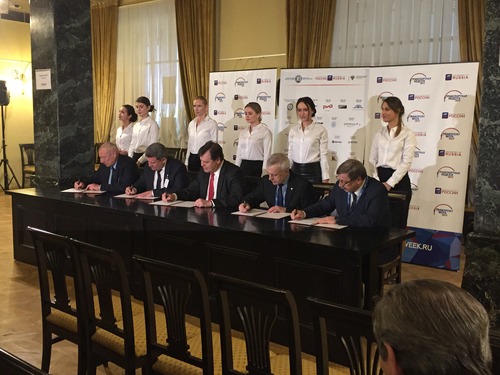ÐÎÑÑÈÉÑÊÈÉ ÏÐÎÔÅÑÑÈÎÍÀËÜÍÛÉ ÑÎÞÇ ÌÎÐßÊÎÂ
SEAFARERS' UNION OF RUSSIA
A NON-UNIONIZED SEAFARER
IS AN UNPROTECTED SEAFARER
Back
Trade Unions and Employers Signed Industry Agreement on Maritime Transport

On 6 December, in Moscow, within the framework of the Transport Week–2017, the unions and employers signed the Federal Maritime Transport Industrial Agreement for 2018–2020. On behalf of the Seafarers’ Union of Russia (SUR) it was co-signed by President Yury Sukhorukov.
The signing was preceded by lengthy negotiations of the parties, All-Russia Trade Association of Maritime Industry Employers “Russian Chamber of Shipping” and the Unions’ Single Representative Body. The latter, in addition to the SUR, comprises of the Water Transport Workers Union of the Russian Federation (WTWU), Russian Oil, Gas and Construction Workers’ Union (ROGWU), Russian Trade Union of Nuclear Power and Industry Workers (RTUNPIW). Initially, there were quite a lot of disagreements between unions and shipowners, but, thanks to painstaking work, it was gradually possible to settle almost all disputable issues. As a result, a document fundamentally different from the previous one, was adopted.
The previous agreement on maritime transport included several economic activities, in one way or another related to maritime shipping. On behalf of employers, the Association of Shipbuilding Yards and representatives of seaports took part in it. The signed agreement, due to the fact that the Russian Chamber of Shipping represents the side of employers, regulates the working conditions exclusively for seafarers.
Nevertheless, some disagreements between the parties still remained and were consolidated in the relevant Protocol. In particular, the shipowners did not agree to the proposal of the unions to introduce supplementary payments for seafarers for night work at a rate of 35%, and the obligation not to impose on ships’ crews the work that dockers normally perform, was not included in the Agreement. And the last point that became the part of the Protocol of Disagreements is the proposal of the union side to complement the Agreement with a paragraph on working conditions of ship crews in the areas of military and pirate actions and epidemiological dangers.
“Despite the fact that the issue of working in hazardous areas was in disagreement, we have agreed with the shipowners to create a permanent Commission for Regulating Social and Labor Relations in Maritime Transport,” – said Igor Kovalchuk, the SUR First Vice-President and Coordinator of the Unions’ Single Representative Body at the talks. – “Within the Commission’s work, this issue and some other topics concerning the maritime community will be considered.”
Up
